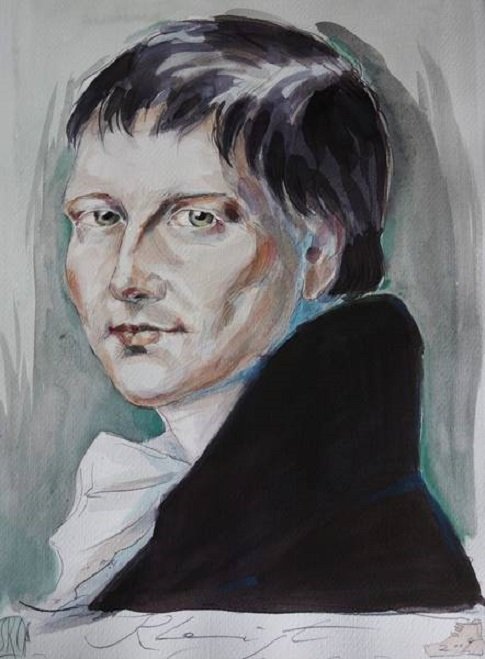Live and creativity of Heinrich Wilhelm von Kleist. Kleist's Aesthetic Views. /part 2/
Although closely related to the creative circles of the Romanticians, it is difficult to discover in Kleist's works typical romantic themes and attitudes. Kleist is a dynamically evolving intellect that finds itself often in the captivity of its fantasies, and is overwhelmed by the unimaginable ambition to overcome its loneliness. This German writer is one of the first explorers of the tragic fate of a man who lives at a time when she is not yet as painfully aware of his inevitability. After his profound reading of Kant and Fichte's philosophical treatises, this unique artist, endowed with sophisticated intellectual insight, comes to the conclusion that the essential core of truth is unattainable to human reason, that is, man's perception of the world is irreparably distorted.
This conclusion undermines Kleist's conviction that the blissful call to achieve soulful cheerfulness and happiness through "life in harmony with nature" can restore the inherent human innocence. In a short essay on the puppet theater, written at the end of his life, Kleist carried his bitter reflections into the field of aesthetics. Puppet Dance is much more graceful than dancing to any living actor, as it escapes from the scrutiny of refiection. Likewise, any more treacherous bear can defeat even the most skillful fencer, as the animal acts in full confidence in its instincts. If a young dancer achieves an uncomplicated graceful posture in his exits, he can not reach it again by conscious effort. According to Kleist, grace is a fleeting unintentional achievement without the intervention of consciousness, and is only achievable by consciousness with infinite power - God, or the mechanically activated doll. This questioning of the possibilities of rational logic is the starting theoretical attitude in many of the fragments of the Roman romantics (Friedrich Schlegel and Novalis).
Kleist, in turn, casts doubt on the possibility that a sense that has begun beyond the limits of consciousness can bring confidence in the intimate world of man. This doubt, in fact, arises in him, after the discrediting of his confidence that the truth is rationally achievable. Kleist as a playwright: In the first works of Kleist, a highly acclaimed and undoubtedly representative of the German theater school in the era of Romanticism, we find borrowings from the spectacular poetics of the sentimental "fatal drama. As a playwright, he often discusses on the scene the possibilities of man to gain access to the truth by feeling and language. In his writings, Kleist transforms the unsettled quests of his spirited soul, the bold raids of thought toward the establishment of unconditional truth, the insatiable longing for self-determination, freedom and all-encompassing love, the elevation of the patriotic feeling in the chief decree of life.
He finds himself not so much in the boldness of the fantasy with which he unfolds a livelihood, as in the intertwined and intricate drama of soul peace, the overwhelming conflicts with a hostile world full of delusions and coincidences: in the works of Kleist plots, heroes, the scene changes, at the center of the action are men or women, but under each image lies the dramatic self of the poet, his contradictory inner essence, everywhere he feels an edge to a broken string, because the leads almost always over man the ordinary, in an over-scale emotional sphere of moral effect.

You got a 13.98% upvote from @postpromoter courtesy of @godflesh!
Want to promote your posts too? Check out the Steem Bot Tracker website for more info. If you would like to support the development of @postpromoter and the bot tracker please vote for @yabapmatt for witness!
To listen to the audio version of this article click on the play image.

Brought to you by @tts. If you find it useful please consider upvoting this reply.